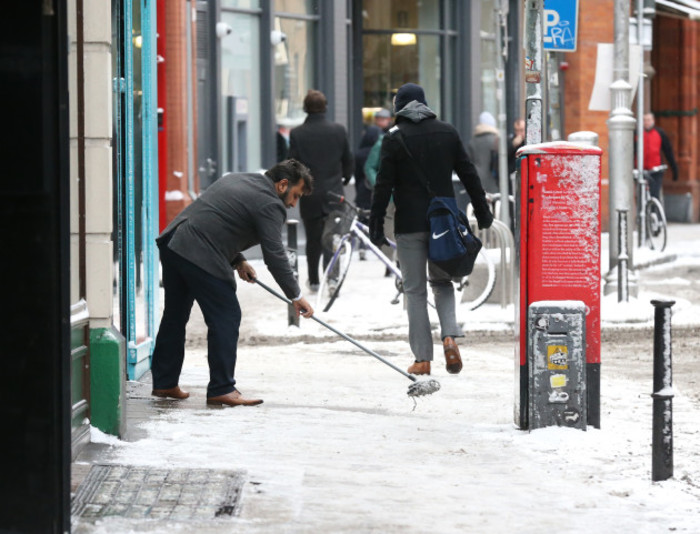Here's what employers need to know about the 'Beast from the East'
ISME says it’s ‘imperative’ firms have a staff safety and communications plan in place.
EMPLOYERS HAVE BEEN advised to put in place a staff communications and safety plan in case the bad weather worsens over the coming days.
Neil McDonnell, head of small business organisation ISME, said it is “imperative” that business owners have a strategy in place to deal with red weather warnings.
Earlier this morning, Met Éireann issued a ‘status red’ snow-ice warning for counties Dublin, Kildare, Louth, Wicklow and Meath, which is in effect until midday tomorrow.
ISME has reminded its members that they have a duty of care for all employees under the Safety Health and Welfare at Work Act.
When considering whether or not to call off work, business owners must bear in mind the greater risks to staff in certain roles like ‘on-the-road’ jobs and certain sectors such as the construction industry.
Small- and mid-sized firms have been told to listen to the advice of the National Emergency Coordination Group and keep an eye on Met Éireann’s forecasts.
“Businesses must have a plan for how to react to a status red warning and they must have a communications plan,” ISME’s Neil McDonnell told Fora.
“If they take a decision outside of duty hours, how are they going to communicate that to the workforce? It’s a case of having all their personal emails or contact numbers.”
Staff payment
When asked whether or not employers are obliged to pay staff if they’re unable to attend work due to the bad weather, McDonnell said it depends on the nature of employee contracts and the job in question.
“Where an employer closes an employment, they are liable to pay employees. Where they don’t and employees can’t show up and are absent because they couldn’t get in, there are a number of options,” he said.
For example, employers can agree to let staff take holidays or allow them to work back any hours they take off. They can also agree to let them work from home.
Some firms may have employment contracts that allow for a lay off period. Such clauses are common in the construction industry and certain services.
“If they activate those clauses and tell people on Thursday or Friday, ‘We will be laying you off,’ then they’re laid off,” McDonnell said.
ISME has also welcomed the fact that government has not yet taken the decision to issue a nationwide warning as they did during Storm Ophelia in October last year.
“We can see very clearly that this weather event is regional in nature. At the moment it’s hitting the east and the midlands,” McDonnell said. “The west and the south at the moment are not affected. It is right that we haven’t shut all schools and businesses.”

Dublin Chamber has issued similar advice to its members.
Head of public affairs Graeme McQueen said it was important that employers pay attention to warnings or messages from Met Éireann, the Road Safety Authority and other official bodies.
“The weather is likely to change during the course of the day, with more snow forecast, meaning that journeys which are possible now may not be possible later,” McQueen said.
“The number one priority for any business during adverse weather events should be the safety and well-being of staff, clients and customers.
“We would encourage all employers to keep up-to-date with weather warnings and to put contingency arrangements in place, which plan for both worst and best case scenarios.”






